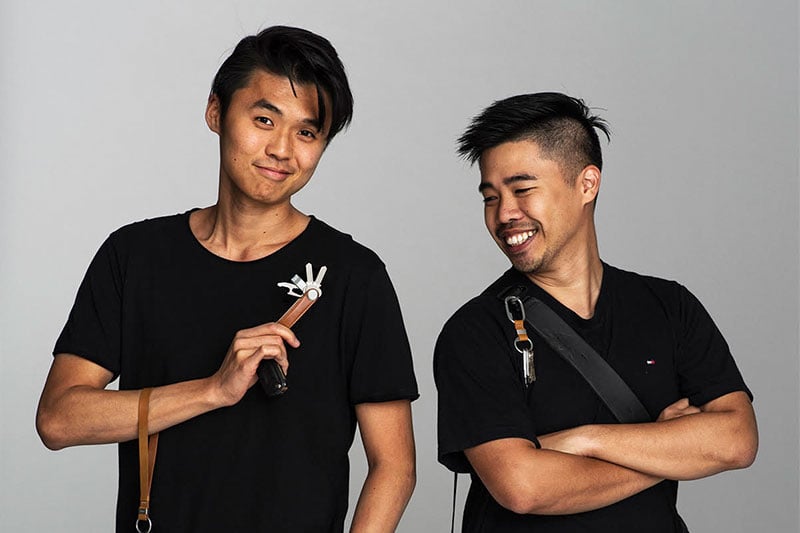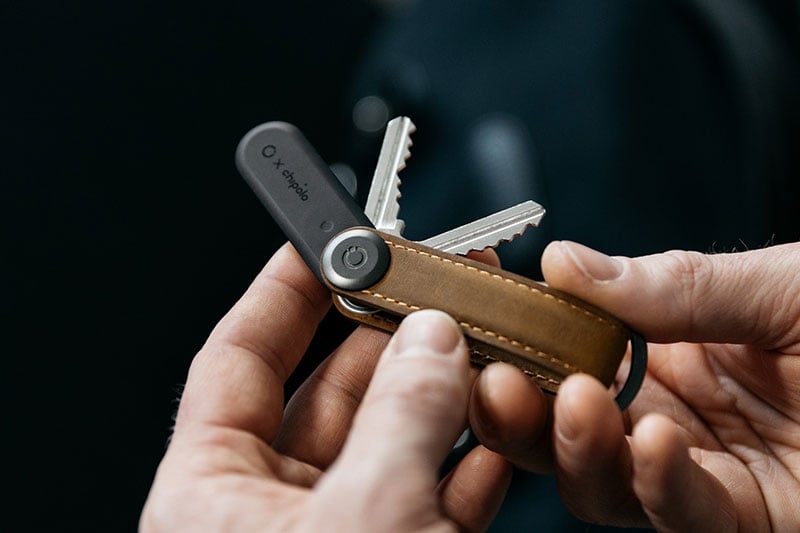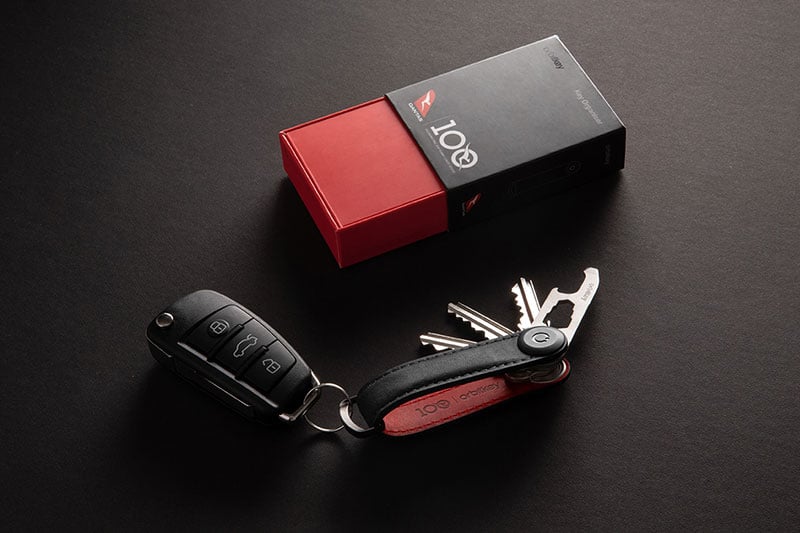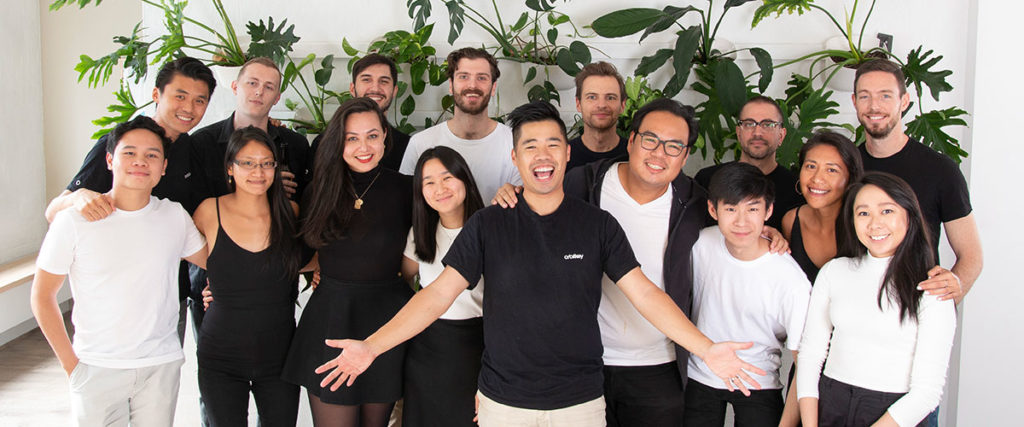Launched in 2013, Australian design startup Orbitkey rose to national acclaim when it became the highest funded and most popular crowdfunded Melbourne project of all time. Find out how here.
Inspired by intentional living and contemporary industrial design, Orbitkey is a Melbourne-based company that creates accessories to help make your day less cluttered – and less noisy.
Their very first product, a key organiser, raised AUD 210,000 from 5,000 backers on Kickstarter – a whopping 2100% increase from their initial funding goal of AUD 10,000, which they smashed in 16 hours.
Co-founders Rex Kuo, a former ‘legal drug dealer’ turned startup founder, and Charles Ng, an industrial designer, first met in Year 11, embarking on their first venture together a couple of years later to solve one problem: messy, jingling keys. Since then, they’ve expanded their product range to include other deceptively simple yet endlessly stylish accessories aimed at helping people organise their lives.
A Climate Neutral Certified brand, Orbitkey has raised over AUD 2 million from 33,000 backers to date via crowdfunding, and have worked with 700+ retail stories around the world. Hive Life sat down with Rex and Charles recently to see what they’ve been up to, and divulge their tips on how to launch a successful crowdfunding campaign – even when you haven’t defined your target audience yet.

What was the inspiration behind Orbitkey?
Charles: The idea for Orbitkey initially stemmed from our own frustrations with jingling keys. I used to go jogging a lot but I hated the sound of keys rattling around, so I built this clamp out of the screws I had lying around at home and it did the job perfectly.
Rex: He actually didn’t show me his prototype until one year later when I’d told him how conscious I was about putting my keys in the same pocket as my phone or wallet because I didn’t want them to scratch. And that’s when we started looking into a whole bunch of ways we could help people – young professionals, especially – declutter their lives and improve organisation. So that’s what Orbitkey offers. Are there other companies out there doing something similar? Yes, there are – but we’re really trying to push from the point of using the power of design to come up with products that are not only aesthetically pleasing, but also functional and a source of pride for our customers.
What made you decide to go down the crowdfunding route?
Charles: Honestly, we started with crowdfunding because we didn’t have a clear idea of what we wanted Orbitkey to look like yet, or if there was even a market for our design. Kickstarter was the perfect platform for us to ‘test the waters’ without wasting thousands of dollars on mass production. It was also an excellent way to connect with the end-users and refine our design based on the constructive feedback we were receiving. When we launched the campaign, we really didn’t expect it to take off. We’d done all the prototyping, marketing, photography and videography ourselves in the space of 9 months – all without consciously going, “right, this is the target demographic we’re going for.” We initially asked for AUD 10,000 as a funding goal, fully prepared to put in our own finances to get Orbitkey off the ground. But, to our surprise, we hit that goal in under 16 hours and went on to raise AUD 210,000 from 5,000 backers in 30 days.
Rex: That’s when all the high-fives turned into fear because now we had to deliver. It wasn’t a side-hustle anymore. So we quit our jobs straightaway, flew to China, and lived out of our suitcases for 3 months to ensure that all our products were made to the highest possible quality. Charles had to extend his visa so many times they threatened to lock him up! Since then, we’ve launched 4 other crowdfunding campaigns and we’ve kept going back to Kickstarter for 2 main reasons.
Firstly, that’s where our core audience is and we always want to give them the first opportunity to back our products again.
Secondly, if it weren’t for crowdfunding, we’d have to bring on external investors which often comes with the pressure to keep pumping out products based on what ‘sells’. We still own 100% of our company and will continue to make products based on what we feel will add value to our customers.

How has the creative process evolved since you first started?
Charles: There’s a lot of luck involved in whatever we’re doing right now, and we’re still figuring it out as we go along. In the beginning, we relied quite heavily on instinct, but now we’re able to validate our assumptions about a product by touching base with our customers throughout. So instead of just showing them the finished result, we’re actively involving them in the process early on and asking, ‘What do you think of this feature? Is this product something you even need?’
For example, when we first came up with the concept of Orbitkey Nest, our portable desk organiser, we selected around 30 of our closest supporters to act as sounding boards for it. When the final product was released, it had already been validated by many months of prototyping and going back and forth between our customers and the design team. I think having that flow of live feedback and just seeing people become invested in our creative journey has been extremely rewarding for us.
Any tips for launching a successful crowdfunding campaign?
Charles: Don’t do all the guesswork in the beginning. Kickstarter had already been around for 4 years when we first launched, so a lot of the groundwork for what a ‘successful crowdfunding campaign’ looked like had been laid beforehand. Rex and I watched lots of Kickstarter campaigns together and pinpointed everything we liked for inspiration. We then came up with our own version based on what we’d learned from other crowdfunders before us.
Rex: My biggest tip would be to design something that solves a problem, and then to centre your entire campaign around that. This was probably what made our first campaign so successful. We set out to solve our own personal headache with jingling keys and it just so happened that others could relate to that same problem too.
Another tip is make a conscious effort to involve as many people as possible during the planning stages, and really walk in their shoes. We reached out to family and friends, as well as other brands and leaders in the industry to ask for their feedback, and sent out regular updates on the design and details of our product. I think not enough crowdfunders do this because they’re scared someone will steal their idea, but what we found was the more we shared, the more feedback we received and the more we were able to refine our product. And then those people who gave us feedback also became advocates for our brand. They would be the first ones to give our campaign a shout out, which allowed it to snowball from there.

How has your business adapted in response to COVID-19?
Rex: We’ve been lucky in that we’re not as hard hit as others, but it’s definitely forced us to make some changes. Right from the outset, we wanted to have our products held in brick-and-mortar retail stores, and we had over 1000 stores before COVID-19. Now that this channel is no longer available, we’ve had to pivot more towards online channels and support those retailers trying to open online stores.
We’ve also implemented some product pivots as well. Besides key organisers, we also had a carabiner, a lanyard strap, a Chipolo tracker for locating missing items, and had planned on releasing a retractable leash for ID cards. But since no one is commuting to work in offices anymore, we’ve put that on the backburner and changed our design product roadmap to cater more towards the ‘working from home’ message.
So I’m really excited about our newest product – a portable, refillable hand sanitiser holder – launching this June. I came up with the idea while shopping with my wife when I noticed how inconvenient it was to disinfect our hands on the go. We’re giving away 500 units of these to frontline workers, and donating 100% of profits to a charity or organisation of the customer’s choosing.
What are some of the biggest challenges you’ve faced as entrepreneurs?
Charles: It’s funny because I don’t think I’ve ever been so challenged in my life! The moment you think you’ve got everything under control is when the unexpected starts happening. But one of the biggest challenges for me has definitely been getting out of the mindset that I’m ‘just a designer’ or ‘I shouldn’t be doing this’, and instead focusing on ‘where can I bring the most value right now?’ Even now, I still write ‘designer’ as my occupation when filling out immigration forms. Another challenge is being able to let go. We’ve grown from being just the two of us doing everything, to having a talented team of almost 20 people who have a lot more expertise than we do. So letting go is hard, but I’m getting better. It actually feels nice when I get to say, “Hey, you’ve got this one.”
Rex: Yeah, ‘business owner’ still sounds a little weird. For me, a big challenge is being able to switch off. Finding that balance between family time and work time can get tricky, especially now that we’re working from home. But like Charles said, we’ve come such a long way. Working as a pharmacist 6 years ago, I never expected to be travelling the world or going to trade shows or having phone calls 4 times a day with partners overseas. To stand alongside these massive brands we used to be consumers of, and to be acknowledged at international design awards really makes you realise that, ‘Wow, I’m not just selling a product because it makes money. I’m selling something I truly believe in – something that’s thoughtful, functional and beautiful.’
Orbitkey’s latest product has been dispatched on 5 June 2020. Stay tuned on www.orbitkey.com.
Related Articles
Sandbox VR: How a Millennial Founder Engineered a USD 79M Gaming Sensation
Houseparty: The Viral Video Alternative to Zoom Amidst COVID-19?
Meet the Brains Behind Asia’s Snacking Phenomenon The Golden Duck





